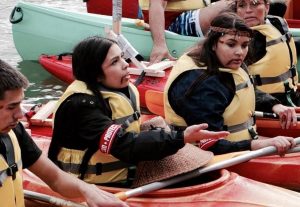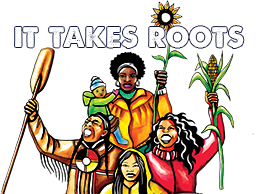For Immediate Release:
December 7th, 2015
Contact: Dallas Goldtooth, Indigenous Environmental Network, France: +33 75 1413 823, US: + 708 515-6158, [email protected]
 Paris – An all-Indigenous flotilla of kayaks took to the waters of Paris today, followed by a press conference featuring Indigenous leaders from the Americas delivering strong messages: warnings of the worst consequences of climate change, and holistic solutions to protect Mother Earth. This event, proposed by the Kichwa community of the Sarayaku, served as a platform to reject false climate solutions, and to deliver three key documents designed as a means to address climate change.
Paris – An all-Indigenous flotilla of kayaks took to the waters of Paris today, followed by a press conference featuring Indigenous leaders from the Americas delivering strong messages: warnings of the worst consequences of climate change, and holistic solutions to protect Mother Earth. This event, proposed by the Kichwa community of the Sarayaku, served as a platform to reject false climate solutions, and to deliver three key documents designed as a means to address climate change.
The flotilla action this afternoon was made all the more poignant and necessary, following the first week of negotiations at COP21, where – despite vocal objections and protestations by Indigenous Peoples and their allies – the operative text of the Paris Accord has had the language concerning the rights of Indigenous Peoples “annexed” (meaning it’s not totally in the draft agreement, nor is it being fully excluded), rendering it’s future inclusion questionable.
“Considering that Indigenous communities often face the worst consequences of climate change, the decision to reject Indigenous Rights and advocate for false solutions is not only offensive and intolerable, but illogical and destructive to the climate change movement as a whole.” – Dallas Goldtooth, Keep Fossil Fuels in the Ground Campaign Organizer. “Carbon trading and REDD+ projects are schemes to continue business-as-usual, nothing more. We, as frontline Indigenous communities, are the arbiters and innovators of real solutions towards mitigating climate change.”
Indigenous Peoples from the Amazon to the Arctic and their allies have and will continue to gather to demand real climate solutions, including bottom-up initiatives originating in Indigenous knowledge, culture, and spirituality.
“We’re here to present our proposal of kawsak-sacha: the living rainforest, the living Amazon. This proposal respects all living beings and helps achieve a balance of our planet, our Mother Earth. Indigenous peoples live with this wisdom – live in harmony with these living beings, and we’re here to protect the lagoons and the water, the trees and the mountains. We ARE the balance, we LIVE the balance and this is our contribution here in Paris.” Felix Santi, Sarayaku
“Only if our proposal is heeded will we be able to ensure the future, ensure the planet for future generations – so we present this proposal to the governments of the world and we declare indigenous peoples’ territories of vital and crucial importance to the future of our planet. There must be no more oil drilling, no more mining, no more logging on our lands and territories, and we must embrace this indigenous proposal of the living forest”.
For the second week of negotiati ons in Paris, Indigenous delegates are calling on their allies to push the parties involved in direct negotiations to reverse this damaging decision, thereby taking the climate change movement forwards, not backwards.
ons in Paris, Indigenous delegates are calling on their allies to push the parties involved in direct negotiations to reverse this damaging decision, thereby taking the climate change movement forwards, not backwards.
“The ground we walk on is literally melting beneath us. Indigenous peoples of the world are being affected by this climate chaos first, and our issues are compounded by the assault on our traditional territories by the fossil fuel extractive industries.” – Faith Gemmill, executive director REDOIL. “We kicked Shell out of the Arctic but immediately following that, the state and our congressional representatives called for drilling in the last 5% of America’s only Arctic coast: the Arctic National Wildlife Refuge, which is sacred to my people. This is our home, these are our sacred places, and it is our belief that the destruction of humanity begins if/when the oil companies gain access to these sacred places. We’re here to call upon the governments of the world to recognise the rights of Indigenous Peoples within the operative, legally binding text. No more business as usual – we don’t have the luxury of time. Humanity’s survival is on the line. We need a just transition to sustainable energy, economies and communities.”
